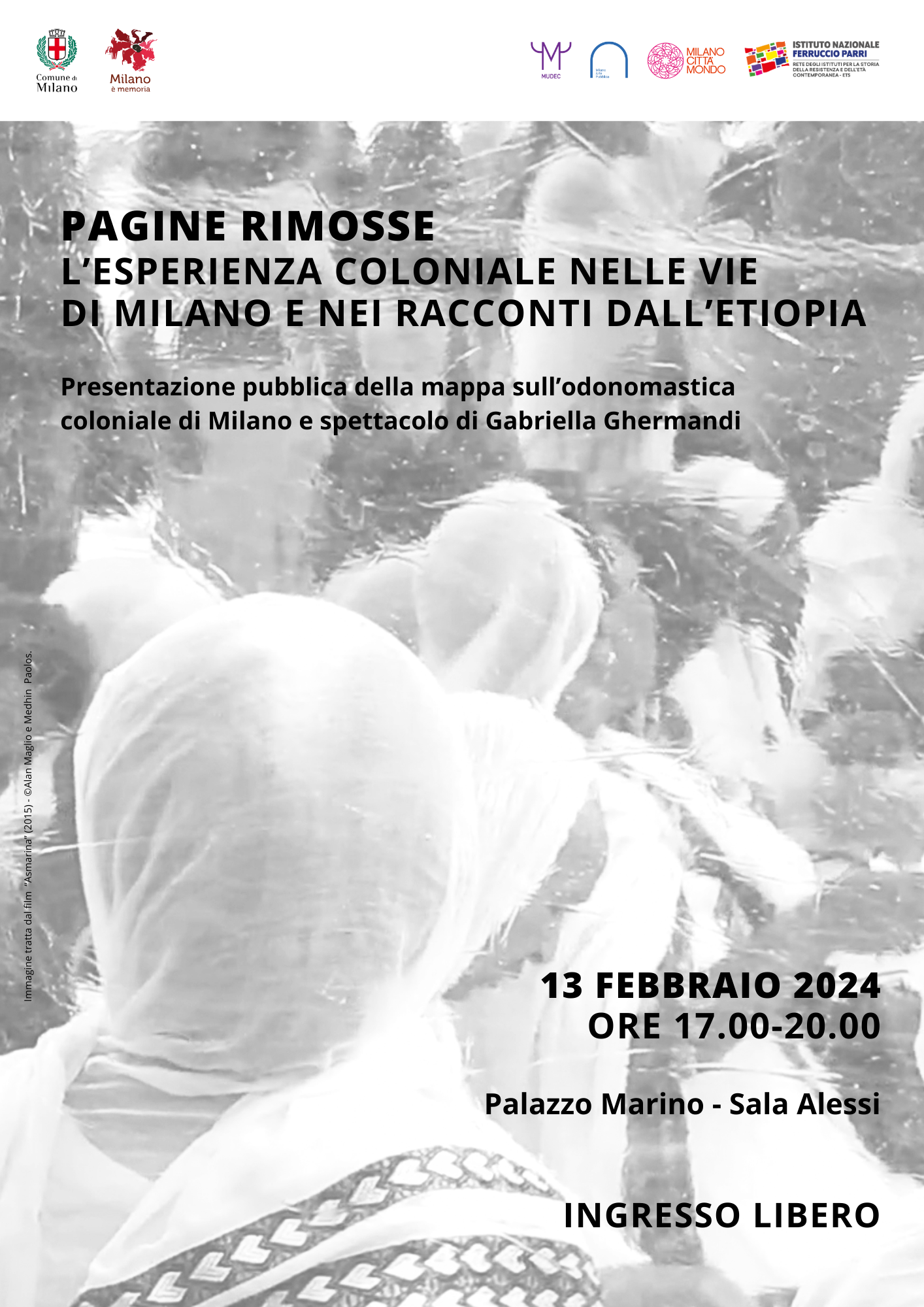Pages removed. The colonial experience in the streets of Milan and in stories from Ethiopia.
-
Alessi Room - Palazzo Marino
-
13 February 2024
-
17:00

Public presentation of the map, of the research on colonial odonomastics in Milan and performance by Gabriella Ghermandi.
Il City of Milan, Museum of Cultures andFerruccio Parri National Institute invite the citizens Tuesday 13 February 2024 to the public presentation of the map and research on colonial odonomastics present in the territory of the city of Milan and to the artist's show Gabriella Ghermandi "Queen of Flowers and Pearls – the story of an Italian/Ethiopian family between the racial laws and the Italian occupation of Ethiopia”. The initiative is part of the schedule "Milan is Memory" of the municipality of Milan.
The historical archival research commissioned by the Area Museum of Cultures, Intercultural Projects and Art in Public Space and conducted byFerruccio Parri National Institute focused on the names and titles with references to the colonial campaigns of some streets and squares of the city: through the study of the resolutions of the Milan City Council and the resolutions of the Council it was possible to reconstruct the historical period in which these were called by the city administration. With this research, approximately one hundred and fifty streets and squares named after soldiers, explorers, battles, cities and other locations or people connected to Italian colonial history were identified. The list also includes those cultural institutes and monuments that have played a central role in the debate on Italian colonialism.
The map presented is therefore a useful tool for having a greater awareness of Italian colonial history and its impact on the urban fabric. The work carried out is framed within a broader panorama of reflection on colonial memories. Mudec has reactivated the dialogue with some personalities of the Habesha communities present in Milan, already involved in the participatory museology project undertaken for the preparation of the section dedicated to Italian colonialism within Global Milan. The world seen from here, permanent route of the museum. With a view to a process of rereading our colonial history and re-signifying the heritage but also of the places of the city marked by the presence of colonial names, the Mudec has opened a discussion which is desired to be constant and permanent on the issues of colonialism with towns and citizens even with diasporic origins. The work carried out to date is presented at Palazzo Marino in a highly symbolic week that wants to remember Yekatit 12 (12 February according to the Ethiopian calendar, equivalent to 19 February in the Gregorian calendar) date of the Addis Ababa massacre on 19 February 1937 by the Italian army.
Click here to view the map
The Yekatit Network will participate in the initiative from 12 to 19 February, born within the framework of a global process of critical rereading of modern history, the Network "presents itself as an open, fluid and informal constellation, the expression of a plurality of individual and collective subjects who for years have been interested in Italian colonial history and its complex legacies” and which in the city of Milan finds its peculiar declination through the direct involvement of diasporic subjects.
The presentation will follow, the narration show by Gabriella Ghermandi, “Queen of flowers and pearls - the story of an Italian/Ethiopian family straddling the racial laws of the Italian occupation of Ethiopia.” The show is based on his novel of the same name, which overturns the myth of the "good colonialist" Italian and reconstructs the memory of our colonial past. The narrative show intersects multiple voices: on the one hand the narration of the violent passage of Italian colonialism in the author's maternal family, on the other the stories of the protagonists which are offered to the public through short readings. The narration and readings are interspersed with traditional Ethiopian songs performed by the author/narrator herself.
The event is open to the public, booking recommended Eventbrite.
Upon entry you will be asked to show an identity document.
